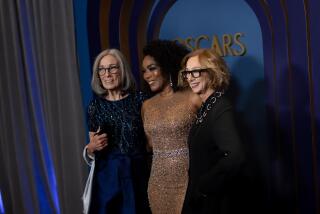Legendary Editor Gets Time in the Spotlight
- Share via
It’s not every day that a person lives to be a century old. And it’s not every day that a talented individual in the film industry is recognized for a lifetime full of achievements.
Today is a special day indeed. Film editor Margaret Booth will be commemorated for more than 70 years of exceptional work, film and otherwise, in a presentation tonight at the Sheraton Universal’s gardens, hosted by the Motion Picture Editors Guild.
For Miss Booth, as she prefers to be called, service to the film industry began in 1915 at a laboratory owned by D.W. Griffith, where she started off as a negative cutter at age 17. In 1921, Louis B. Mayer took her under his wing as an assistant editor at his studios (later joining with Metro and Goldwyn to form MGM), and from there, she went on to become one of the studio’s top editors in the late ‘20s and ‘30s, becoming a supervising film editor in 1939. In the late 1960s she began fruitful collaborations with independent producers, Ray Stark among them.
This evening’s presentation celebrates Booth’s widely recognized success, and, incidentally, her 100th birthday on Friday. The Editors Guild board of directors has an annual inauguration dinner each January for new members, but this year has planned something different.
“Normally, the Editors Guild does not give awards,” said Rachel Igel, who serves on the board. “This is sort of an unusual situation because she is turning 100.”
Donn Camberne, president of the guild, will present the award at this evening’s ceremony. “She has an incredible history. From 1937 deep into the ‘60s, she oversaw almost every film that came out of MGM,” he said.
Though Maggie Booth has come to be a household name in the world of film editing, she was never an industry socialite. She is notoriously shy, and her privacy has always been respected. She has given only a handful of interviews, one of the most well-known of which appeared in Kevin Brownlow’s “The Parade’s Gone By” in 1968. The book is devoted to icons of silent film and early theater, and Booth is accorded an entire chapter.
Even so, she was never particularly visible to the public eye. But her active career in the film editing field has touched many. Fellow editor John F. Burnett first encountered Booth while working for MGM in the ‘60s. “I got a call in September of ’69 asking me to come to her office,” he recalls. Burnett’s name had been passed along as a “pretty good talent,” and before he knew it, he was whisked off to New York to work with producer Stark, thanks to Booth. “We’ve been extremely close for all these years since.”
Booth worked as an editorial producer in a close partnership with Stark at Rastar Productions for a large chunk of her career, collaborating on projects like 1973’s “The Way We Were” until her retirement at age 88 in 1986.
Tonight is not the first time Booth has been honored for decades of contribution to the film industry. She was nominated for an Academy Award for her work on 1935’s “Mutiny on the Bounty,” and was presented with a lifetime achievement Oscar in 1977 for her consistently extraordinary work throughout her career. Her speech was one of the few times audiences had the chance to see her in public, but even in its brevity, the image represented her well: smart, polite and to the point. “Isn’t it wonderful that one can win an award for something one loves to do? I love my work, and thanks to Ray Stark, I’m still doing it.”
More to Read
Only good movies
Get the Indie Focus newsletter, Mark Olsen's weekly guide to the world of cinema.
You may occasionally receive promotional content from the Los Angeles Times.










